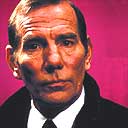
Most eyes next year, however, will be focused on the restructured Royal Shakespeare Company. We now know the first fruits of Adrian Noble's deliberations. The Winter's Tale, Pericles and The Tempest will play at London's Roundhouse before moving to Stratford in mid-summer. Much Ado and Antony and Cleopatra will open the Stratford season in the Royal Shakespeare Theatre before, presumably, coming to London. And the Swan will house a mixed batch of largely unfamiliar "Jacobethan" plays including The Roman Actor, Eastward Ho! and The Malcontent.
The proof of the pudding will be in the eating. But two thoughts already strike me. One is that the removal from the equation of Stratford's Other Place - to be enlarged in order to accommodate Shakespeare productions when the RST itself is rebuilt - means that there is no room for new work in the coming season. The second is that the RSC's surrender of its London home, the Barbican, in many ways takes the company backwards - to the 1950s, to be precise, when selected Stratford productions would come to whatever West End theatre happened to be free at the time. Perhaps the RSC will miss the Barbican rather more than it realises.
Trevor Nunn, meanwhile, enters his final 15 months at the National with the place in reasonable shape. My biggest regret is that South Pacific clogs up the Olivier until the end of April. By the time it closes, it will have had a "commercial" run of five consecutive months in the National's prime house. But at least there is life after Rodgers and Hammerstein. Peter Hall's new production of The Bacchae and a Tom Stoppard trilogy will follow South Pacific into the Olivier. New plays are also promised from Sebastian Barry, Nicholas Wright and Christopher Hampton, while the National's Humble Boy and Mother Clap's Molly House move into the West End. At its best the National does a good job; it is Nunn's delight in naff musical revivals that bugs me.
I suspect much of the real excitement next year will lie in regional theatre, once the Arts Council's extra £25m starts to work its way through the system. The Sheffield Crucible kicks off the new year with Pinter's The Birthday Party, Kenneth Branagh in Richard III, and a Peter Gill festival, including yet another premiere, Original Sin. The Royal Exchange, Manchester, vouchsafes Pete Postlethwaite in The Homecoming, plus Beaumarchais's Marriage of Figaro, Mamet's American Buffalo and Sex, Chips and Rock'n'Roll from Debbie Horsfield and Mike Moran.
The new money may not yield untold riches. What it does do is offer a measure of stability and scope for proper planning. 2002 will be the year in which we can judge whether it has finally helped to end our theatre's prolonged siege mentality and provided the necessary kick up the arts.

